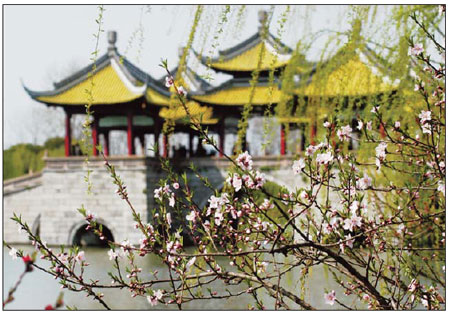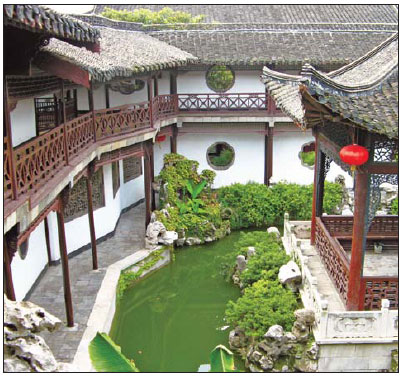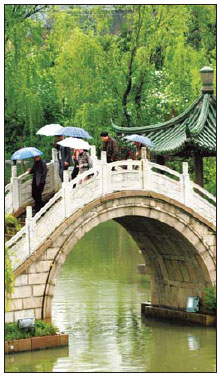Share Your Experience
'Sailing to Yangzhou'
Updated: 2011-05-05 07:54
By Zhang Yue (China Daily)
|
Five Pavilion Bridge, built 500 years ago on Slender West Lake, in Yangzhou. Fan Youlin / for China Daily |
|
The 200-year-old Heyuan is a fine example of Yangzhou's private gardens. Xu Baoping / for China Daily |
|
A view of the lake in the rain. Zhao Jun / for China Daily |
It's best to visit Yangzhou in spring, when the gardens and parks are blooming, even if the place is crowded, Zhang Yue discovers.
My trip to Yangzhou coincided with Qingming (Tomb Sweeping) Festival in April and I was worried about the crowds.
I've never been a big fan of scenic spots during holidays because in most cases you will find yourself surrounded by elbows, trying to find a way out.
Luckily, my two-day trip to Yangzhou, in Jiangsu province, was filled with pleasure.
My interest in Yangzhou was aroused by a Tang Dynasty poem written by Li Bai about 1,300 years ago - "Sailing to Yangzhou in March when blossoms curl like smoke on the river".
Obviously, I was not the only one who wanted to enjoy spring's first exhalations in this picturesque city.
When I called up the hotel one day before my arrival I was told that 95 percent of the rooms had been booked.
"You really should have called earlier," hotel staff told me. "Spring is the best time to visit Yangzhou."
My friend and I took a bus from Yangzhou train station to the downtown area, where our hotel and most of the scenic spots are located.
 |
Spring painted the city in brilliant colors, with flowers blooming at every turn. Many buildings, including garment stores, banks and cafes, schools and restaurants, are built in a traditional style, with gray and green tiles on rooftops, and white walls.
For centuries, the city has been graced by literati such as the poet Li Bai, and dignitaries like the Qing Dynasty (1644-1911) Emperor Qianlong.
Slender West Lake, one of the biggest draws in the city, was our first stop. The park, lined with willow trees, pagodas and loads of history has enough to keep a visitor busy for the entire day.
People say some parts of the lake are so narrow you can hear what others are saying on the other bank. It's a joke, I guess, as I wasn't even able to hear what my friend was saying to me because of the crowds.
Five Pavilion Bridge, built on the lake 500 years ago, is an iconic symbol of Yangzhou. Always bustling with activity, the bridge offers excellent elevated views of the lake and is also a good place to catch a pleasant breeze.
Yangzhou is a city of gardens. At one time, it boasted more than 200 intricately landscaped private gardens, a number that has been reduced by the turbulence of the ages to just under 30.
One of the best preserved of these is Heyuan garden, once owned by the family of He Zhidao in the Qing Dynasty.
With an area of 10,000 square meters, it is an intricate maze of gardens and buildings where you may easily get lost. There are some Western architectural influences, but overall it has a nostalgic late-Qing era feel.
While visiting the garden, you'd better hire a tour guide who will tell you the history and help you appreciate its beauty.
For example, Boat Hall was named by its owner, He Zhidao, because it has a boat shape and there are wavy patterned tiles on the floor.
The Double Paths Flyover Corridor, which is about 1,000 meters in length, passes through the gardens and connects the major buildings.
Walking along the corridor, we visited bedrooms, living rooms and studies, occasionally stopping to enjoy a great view of the garden.
"How I wish I could live in a house like this!" I overheard a boy say loudly to his mother.
In response, I thought, I wish I could live in a city like this!
We were so immersed in sightseeing that we almost missed our train back home.
Specials

China Daily marks 30th birthday
China's national English language newspaper aims for a top-notch international all-media group.

Room at the inn
The Chinese hotel industry experiences a building boom, prompting fears of oversupply.

Pearls of wisdom
Chinese pearl farmers dominate the world market but now want to work smarter, not harder


